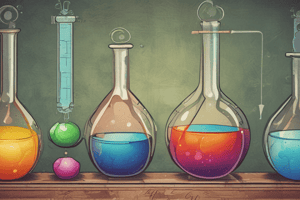Podcast
Questions and Answers
What is the pH of a solution that is considered basic?
What is the pH of a solution that is considered basic?
- Equal to 14
- Exactly 7
- Greater than 7 (correct)
- Less than 7
Which of the following is a characteristic of acids?
Which of the following is a characteristic of acids?
- They are slippery and soapy to the touch
- They can turn blue litmus paper red (correct)
- They have a bitter taste
- They conduct electricity in water
What happens when an acid and a base react?
What happens when an acid and a base react?
- They form carbon dioxide and water
- They form a salt and water (correct)
- They form hydrogen gas
- They form oxygen and water
What is the pH of a neutral solution?
What is the pH of a neutral solution?
What do bases feel like to the touch?
What do bases feel like to the touch?
What do acids produce in water?
What do acids produce in water?
What color does phenolphthalein turn in basic solutions?
What color does phenolphthalein turn in basic solutions?
Which indicator solution turns blue in basic solutions?
Which indicator solution turns blue in basic solutions?
Which property is NOT associated with bases?
Which property is NOT associated with bases?
What color does litmus paper turn in acidic solutions?
What color does litmus paper turn in acidic solutions?
What is the main purpose of indicator solutions?
What is the main purpose of indicator solutions?
Which indicator solution is yellow and turns blue in acidic solutions?
Which indicator solution is yellow and turns blue in acidic solutions?
Flashcards are hidden until you start studying
Study Notes
Acid and Bases: Understanding the pH Scale, Acid-Base Reactions, and Indicator Solutions
Acids and bases are essential in many chemical reactions and play a crucial role in various biological processes. In this article, we will explore the pH scale, acid-base reactions, properties of acids, properties of bases, and indicator solutions.
pH Scale
The pH scale is a numerical scale used to express the concentration of hydrogen ions (H+) in a solution. It ranges from 0 to 14, with 7 being neutral. Solutions with a pH less than 7 are acidic, while those with a pH greater than 7 are basic or alkaline. The pH scale is logarithmic, meaning that each whole number represents a tenfold change in the concentration of hydrogen ions.
Acid-Base Reactions
Acid-base reactions are chemical reactions in which an acid and a base react to form a salt and water. In an acid-base reaction, a proton (H+) from the acid is transferred to the base, and a conjugate base is formed. This reaction is neutralized, and the solution becomes neutral.
Properties of Acids
Acids have the following characteristics:
- They are sour-tasting.
- They can turn blue litmus paper red.
- They conduct electricity in water.
- They have a sour taste.
- They produce hydrogen ions in water.
Properties of Bases
Bases have the following characteristics:
- They are slippery and soapy to the touch.
- They are basic or alkaline in taste.
- They can turn red litmus paper blue.
- They conduct electricity in water.
- They neutralize acids.
Indicator Solutions
Indicator solutions are substances that change color in response to changes in pH, making it easier to determine the acidity or basicity of a solution. Some common indicator solutions include phenolphthalein, litmus, and bromothymol blue. Phenolphthalein is a pink indicator that turns colorless in acidic solutions and pink in basic solutions. Litmus paper is a widely used indicator, turning red in acidic solutions and blue in basic solutions. Bromothymol blue is a yellow indicator that turns blue in acidic solutions and yellow in basic solutions.
In conclusion, acids and bases play a significant role in various chemical reactions and biological processes. Understanding the pH scale, acid-base reactions, properties of acids, properties of bases, and indicator solutions is essential for working with these substances and predicting their behavior in different environments.
Studying That Suits You
Use AI to generate personalized quizzes and flashcards to suit your learning preferences.




